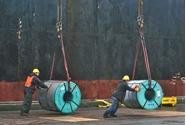Prices

April 30, 2015
Analysts Push US Steel for Answers on Rumored Trade Cases
Written by John Packard
During the latest slew of earnings conference calls by the domestic steel mills, analysts were relentless in their pursuit of information regarding trade cases which would conceivably impact the flow of imported steel into the United States. The steel mill CEO’s and other mill executives associated with the conference calls were more than willing to point out the impact of what they believe to be “unfairly traded” imports which have been taking market share from the domestic producers.
United States Steel (USS) reported earnings earlier this week and conducted their earnings conference call on Wednesday morning. USS CEO Mario Longhi was prepared to deal with the questions about possible trade cases as well as the move the domestic mills have been making to lobby the U.S. Congress to change the definition of “injury” which would make the filing of cases easier for the domestic mills.
U.S. Steel provided a document entitled, “First Quarter 2015 Questions and Answers” which can be accessed through their website. One of the questions dealt with the question of trade cases and the process that USS (and other mills) goes through when making a determination that a case should be filed:
“5. What is U. S. Steel’s approach to trade cases and how do you determine if one should be filed?
“The process by which we consider whether to file a potential trade case is complex, constant and lengthy, informed by the requirements set forth in the Tariff Act of 1930, which provides for the right of American industries to petition for relief from imports that are sold in the United States at less than fair value (“dumped”) or which benefit from subsidies provided through foreign government programs (Countervailing Duties, or “CVDs”). Under the law, the U.S. Department of Commerce determines whether the dumping or subsidizing exists and, if so, the margin of dumping or amount of the subsidy; the US International Trade Commission determines whether there is material injury or threat of material injury to the domestic industry by reason of the dumped or subsidized imports. The law also requires that the petitioners must represent at least 25% of domestic production and 50% of the domestic production produced by that portion of the industry expressing support for the petition. The petition itself requires the disclosure of all relevant economic factors, Including the domestic industry’s output, sales, market share, employment and profits.
“Continuously managed by our internal international trade lawyers, a multifaceted U.S. Steel team: Surveys the relevant markets; Triangulates market intelligence; Assesses market trends and data; and Integrates and interprets prevailing legal and political concerns. Then, based on a comprehensive review of all factors and considerations, the team renders an informed, sanguine recommendation whether to proceed, at which time other industry participants are engaged through external counsel to determine if the legal requirements can be met to progress a case.”
Mr. Longhi, when asked about the filing of a trade case told the analysts, “…what I can tell you, it’s not a question of if; it’s a question of when. And make no mistake, we are going to fight against illegal dumping. Period.”
Perhaps USS gave the market a sneak peak at what has been holding the mills back from filing a trade case when he said, “…Let me put it to you this way. The cases that are filed, they are not only complex to put together, but they are at one point in time battle that takes place against a certain country or certain company. What we have done though in the bigger strategy, we have proposed trade language that we hope will be part of the ongoing debate on TPA. That language very much clarifies the true definition of injury. It is ingrained into X [US Steel] where we can implement and enforce that law and that is the ultimate solution to a situation.
In reality, I think the debate around TPA has provided us with a window of opportunity where we can implement what I consider to be the ultimate solution to dumping in the country. That is the most critical part of it. So it’s an ongoing affair, but now I think we have a better moment to do something at this point in time that may become the ultimate solution.”
USS executive, Dan Lesnak responded to a question about U.S. steel prices and trade laws, “Well, U.S. prices aren’t one of the criteria for the trade laws. Trade laws are what they’re doing in their markets and what they’re doing in relation to their costs. The U.S. prices aren’t part of the trade laws.”
Lesnak went on to say that they are not having difficulty in proving that foreign steel imports were unfairly traded last year.
Mario Longhi told the analysts that are large portion of the 47 million tons received over the last year and a half are illegally dumped.
Michael Gamberdella ask the question of the day, “Okay. So you can prove that the vast majority of the market illegally dumped even though prices in the U.S. were at such a big premium for all of last year…”
Mario Longhi responded: “Yeah”







